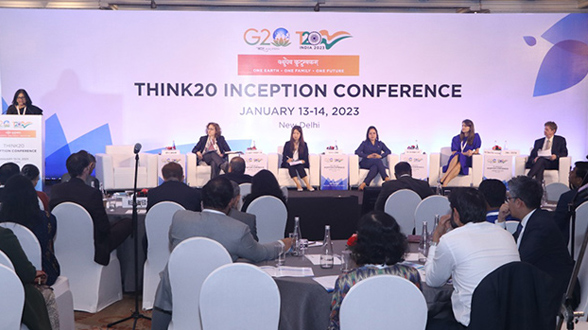Panellists:
- Spotlight: Sachin Chaturvedi, T20 India Core Group, Chair, Task Force 3, and Director General, RIS India
- John J. Kirton, Director and Founder, G20 Research Group, University of Toronto, Canada
- Noura Mansouri, King Abdullah Petroleum Studies and Research Center, Saudi Arabia
- Saehee Jeong, Senior Climate Diplomacy Associate, SFOC, South Korea
- Victoria Pavlyushina, Lecturer, HSE University, Russia
- Elizabeth Sidiropoulos, Chief Executive, South African Institute of International Affairs, South Africa
- Chair: Vibha Dhawan, Chair, Task Force 4, and Director General, TERI, India
Sachin Chaturvedi introduces this spotlight speech by focusing on the various domains under Task Force 3 (LiFE, Resilience, and Values for Wellbeing). He highlights the convergence of development priorities with development finance, amidst the global multifold challenges of the pandemic, resource scarcity, and rising fears of recession and inflation. The question of ethics and value systems becomes a crucial aspect, especially when there is evidence of declining financial architecture, food security issues in many developing countries, alongside the emergence of new-age disruptive technologies like Artificial Intelligence (AI) and Genetic Engineering.
Another important question that Task Force 3 deals with is about lifestyle change. Changes in lifestyle become a pivotal subject matter in this discussion, wherein it does not mean only pushing for an individual behavioural change, but also for the institutional adaptations that align with the planetary goals.
Coming to infrastructure financing, Sachin Chaturvedi implores the panel to discuss extensively the modalities, frameworks, and financing mechanisms of infrastructure that are resilient and inclusive in their approach. He brings up the report produced by Sir Partha Dasgupta, University of Cambridge (Dasgupta Review, commissioned by the UK Treasury in 2019), and advocates looking beyond the common metrics of Gross Domestic Product (GDP) in order to include the issues of biodiversity conservation, overall well-being, and equal participation of member countries. He also recommends that the T20 platform should synergise with multiple expert groups like philosophers, urban planners, geographers, and natural science specialists, alongside economists, to encourage cross-domain connections and cross-boundary collaborations.
The Chair, Vibha Dhawan highlights the urgent need to manage resources in a sustainable way and combat the ongoing climate crisis. Although our personal choices are influenced by the physical environment, cultural convention, social norms, financial and policy frameworks, income levels, and access to resources, Dhawan emphasises the central role that communication and public engagement play in nudging individual behaviour towards positive societal and environmental changes.
Dhawan also identifies the pivotal role of India’s G20 leadership amid the contemporary global climate crisis. At the COP26 in Glasgow, Indian Prime Minister Narendra Modi announced Mission LiFE, wherein individual behaviours are brought to the forefront of global climate action by becoming pro-planet people (P3). The P3 will become a guiding force to promote an environmentally friendly lifestyle as long as the communication, policy engagements, and structural systemic changes are aligned with the overall vision of Mission LiFE. Finally, Dhawan highlights the dual approach of bottom-up and top-down wherein individuals, households, and communities seek meaningful solutions through engaging in grassroots experiments and social innovations.
Director and founder of G20 Research Group, John Kirton addresses the question of how LiFE can bring transitions in accelerating the SDGs, while focusing on humanity’s denominators for economic growth and development. Kirton believes that if ecology is not prioritised, it is the poor that get affected the most. He stressed on the potential that G20 holds in this regard—while the overall region contributes to 80 percent of the global share of emissions, led by China, the United States, India, and Russia, it also offers peatlands, the more potent carbon sinks, mainly in Russia, Canada, Indonesia, and the US.
Noura Mansouri draws attention to how energy security cannot be taken for granted and there is an immediate need to invest and equally value all forms of energy, corresponding technologies, and minerals. She mentions the resolution of the circular carbon economy that was formulated under the Saudi Arabia G20 Presidency in 2020 and endorsed by all G20 member states. Such an economy offers a dynamic, resilient, inclusive, and sustainable approach to climate action.
Elizabeth Sidiropoulos proposes to rethink and completely re-conceptualise the governing paradigms of society. Going beyond GDP will be an avenue to place value on different things like solidarity, cooperation, partnership, and fairness, all are essential for a more equitable and sustainable world. Nevertheless, the difficulties of transitioning from coal-based energy are the most challenging for the least-developed countries. She stresses on how the Global North has created a policy space wherein tax collections and subsequent illicit financial flows are prioritised over helping the developing countries with the required technology transfer and capital support for green transitions.
While Victoria Pavlyushina identifies the merit in prioritising ideas which are quantifiable, Saehee Jeong highlights the need for the transformation of energy infrastructure globally. Bottom-up approaches will be crucial in enabling these, alongside proactive government policies to foster innovation. Such efforts require global cooperation and close coordination between like-minded countries. Jeong identifies the need to revisit, tailor, and restructure the power market system with necessary capital infusion in G20 countries to accelerate the green energy transitions.
According to the International Energy Agency, net zero emissions require a US$ 5 trillion investment annually until 2030, and then a US$ 4.5 trillion investment annually till 2050. The G20 has a crucial role in transitioning towards sustainable energy options by establishing fair market conditions and greater access to renewable energy options.
Watch the full session here.
This event report has been compiled by Soumya Bhowmick, Associate Fellow, CNED, ORF.




